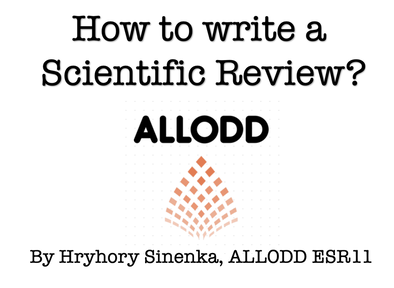|
It may be helpful!! :) Just go to the enumerated points if you don’t have time for the backstory :) Short backstory: as an early-stage researcher in the Allostery in Drug Discovery (ALLODD) Network within Marie Skłodowska-Curie Actions, I got lucky and honored by having an invitation by Dr. Zoe Cournia and Prof. Marco Cecchini (my Supervisor) to contribute, among many other authors, to the yet-to-be-published Review, which topic is connected with alchemical free energy calculations on certain systems, relevant to drug-design. While some final work is yet to be done before the publication, I wanted to share some of my insights on writing, which indeed was a novel experience for me. Although at the first sight the question of “writing a Review” may seem trivial for those who at the beginning of their scientific career already have got their hands on drafting a scientific article in a peer-reviewed journal or have done decent literature work in their Bachelor’s or Master’s Thesis, writing a professional Review may require some additional techniques and persistence. First, the difference between the typical introduction in a peer-reviewed article with your results and a Review is in how exhaustive you need to be to discuss a certain topic. Although in typical articles you certainly need to be well-informed of the current stage of scientific progress on your problem of interest, Reviews often discuss broader issues and may require a more complete literature analysis. Additionally, in your typical article, you may know the most recent advances and key articles through your Supervisor – but a Review could go beyond the scope of their direct expertise, and includes all the most recent advances – which could’ve been missed unless a thorough work to find them was done. Just imagine how many new scientific articles are out there each month. Thus, here are some tips for writing a scientific Review, at least what worked for me:
This is it! I hope that someone finds these pieces of advice helpful and not too obvious – but of course, know that this was only the perspective of someone for whom the Review preparation was a new experience, and who worked only on certain sections of the prepared publication.
1 Comment
|
- Home
- People
- Research
-
Training
-
Training Events
>
- 1st Workshop and PhD Induction Course
- 1st Training School & Networking Meeting
- Allostery in Drug Discovery Awareness Event and Symposium
- 2nd Training School & Networking Meeting
- IPR Training for Researchers & ESR Presentations on the Progress of their Research
- 3rd Training School & Networking Meeting
- European Conference in Allostery in Drug Discovery
- Secondments
- ALLODD Webinars
- Courses & Lectures
- Journal Club
-
Training Events
>
- Dissemination
- Events
- Newsroom
- Job Openings
- Blog
- Contact


 RSS Feed
RSS Feed
